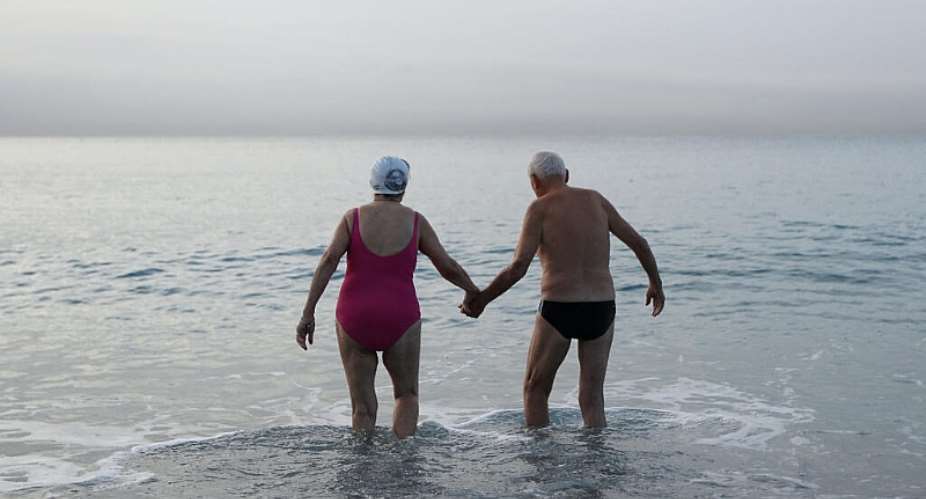Like many developed countries, France is facing an ageing population and low birth rate. Parliament this week approved a law that aims to help seniors "age well". After months of debate, however, MPs across the political spectrum worry the final bill isn't ambitious enough.
The proposed law on "healthy ageing and autonomy" was definitively approved by the upper house of parliament on Wednesday, following a green light from the lower house last week.
"We all want an ambitious reform to meet the challenge of ageing," Renaissance party MP Annie Vidal told France Info.
One of four rapporteurs involved in examining the legislation, she defended the bill as "pragmatic".
But it has been criticised by MPs who say the text falls short of the wider plan on senior care and autonomy promised by President Emmanuel Macron during his first mandate.
"While it includes some interesting advances, this text cannot replace an overall strategy proposed by the government," said Philippe Mouiller, a senator from the conservative Republicans party.
Socialist and green MPs abstained from the vote while the Communist Party rejected the text.
It's "a publicity stunt to give the illusion of progress on this issue" according to Communist senator Cathy Apourceau-Poly.
Among the key concerns is the need for a clear plan for financing elderly care.
Declining birthrate
France's birth rate continues to decline, while life expectancy has increased. By 2030, there will be more people over 65 than under 15.
According to national statistics office Insee, some 678,000 babies were born in France in 2023, the lowest figure since World War II.
The first draft of the bill was tabled in April last year and has seen months of debate by lawmakers, who took into account hundreds of amendments.
One of the articles in the newly approved text requires the government to review the plan "every five years", with a first version required before 31 December 2024.
Visiting rights
The law will protect the right to receive daily visits in health establishments, as well as in places caring for the elderly or people with disabilities.
This came about after many families were cut off from their relatives during the Covid-19 crisis.
A visit can only be refused "if it constitutes a threat to public order" or "a threat to the health of the resident" and that of other members of the establishment, the law says.
The right to visit dying patients or those in palliative care people will now be unconditional, including in the event of a new pandemic.
Under the law, retirement and nursing homes must also guarantee their residents "the right to welcome their pets", on the condition that they're able to care for them properly.
The list of domestic animals and their maximum size is yet to be defined.
Crackdown on elder abuse
Dedicated units are to be set up in each French department where cases of elder abuse can be reported and centralised.
A new feature in the law frees people bound to professional secrecy – such as caregivers, notaries and bankers – to alert the unit without exposing themselves to disciplinary proceedings.
All personal service professionals, including home helpers, will be barred from working if they have been convicted of a crime or misdemeanour. This rule expands a measure that already applied in nursing homes and various medical establishments.
Managers of structures may also be informed of other incidents which do not appear on a staff member's criminal record, such as an indictment or a conviction contested on appeal.
"The objective is to prevent a rapist from continuing to work with vulnerable people for several years while awaiting the final judgment," MP Vidal told France Info.
"Employers will be able to take measures to remove the person in question, in particular by assigning them to a position that does not require contact with the public."
Early intervention
To help older people from the first signs of dependence, appointments will be offered from the age of 60 as part of an "early detection and prevention of loss of autonomy programme".
Under the programme, already tested in several parts of France, people are accompanied to choose their wheelchair, stair lift or hearing aid, as well as arrange their home according to their needs.
Mayors will be also asked to create a register of elderly people or people with disabilities who request certain social and health services.
Such registers are already kept on an opt-in basis and used to check in with vulnerable people in the event of a heatwave.





 Court dismisses Serwaa Amihere case against Henry Fitz, two others
Court dismisses Serwaa Amihere case against Henry Fitz, two others
 Stolen BRVs: Bi-partisan parliamentary probe non-negotiable — Dr. Omane Boamah
Stolen BRVs: Bi-partisan parliamentary probe non-negotiable — Dr. Omane Boamah
 Bawumia begins regional campaign tour on Monday
Bawumia begins regional campaign tour on Monday
 With great urgency backed by verifiable data, facts and figures dismiss COCOBOD,...
With great urgency backed by verifiable data, facts and figures dismiss COCOBOD,...
 EC’s statement on obsolete BVDs discovery “lies, half-truths, pure fantasies” – ...
EC’s statement on obsolete BVDs discovery “lies, half-truths, pure fantasies” – ...
 Nalerigu court impound vehicles of DCE, Director of Chereponi district for owing...
Nalerigu court impound vehicles of DCE, Director of Chereponi district for owing...
 Cop, 7 others grabbed over $523,000 Gold Scam
Cop, 7 others grabbed over $523,000 Gold Scam
 Akufo-Addo’s driver wins Dadekotopon NPP Parliamentary Primary
Akufo-Addo’s driver wins Dadekotopon NPP Parliamentary Primary
 Investigate, jail persons liable for GRA-SML contract – Manasseh
Investigate, jail persons liable for GRA-SML contract – Manasseh
 Lawyer wins Akan NPP Parliamentary Candidate primary
Lawyer wins Akan NPP Parliamentary Candidate primary
